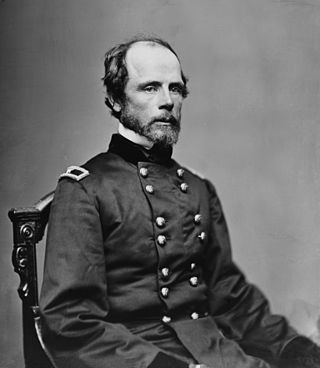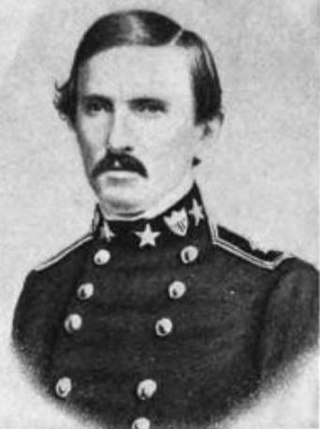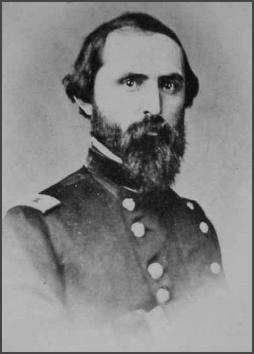This is a list of lists of military commanders.

Irvin McDowell was an American army officer. He is best known for his defeat in the First Battle of Bull Run, the first large-scale battle of the American Civil War. In 1862, he was given command of the I Corps of the Army of the Potomac. He fought unsuccessfully against Thomas "Stonewall" Jackson's troops during the Valley Campaign of 1862 and was blamed for contributing to the defeat of United States troops at the Second Battle of Bull Run in August.

The Confederate States Army, also called the Confederate Army or the Southern Army, was the military land force of the Confederate States of America during the American Civil War (1861–1865), fighting against the United States forces to win the independence of the Southern states and uphold and expand the institution of slavery. On February 28, 1861, the Provisional Confederate Congress established a provisional volunteer army and gave control over military operations and authority for mustering state forces and volunteers to the newly chosen Confederate president, Jefferson Davis. Davis was a graduate of the U.S. Military Academy, and colonel of a volunteer regiment during the Mexican–American War. He had also been a United States senator from Mississippi and U.S. Secretary of War under President Franklin Pierce. On March 1, 1861, on behalf of the Confederate government, Davis assumed control of the military situation at Charleston, South Carolina, where South Carolina state militia besieged Fort Sumter in Charleston harbor, held by a small U.S. Army garrison. By March 1861, the Provisional Confederate Congress expanded the provisional forces and established a more permanent Confederate States Army.

Darius Nash Couch was an American soldier, businessman, and naturalist. He served as a career U.S. Army officer during the Mexican–American War, the Second Seminole War, and as a general officer in the Union Army during the American Civil War.

Robert EmmettRodes was a Confederate general in the American Civil War, and the first of Robert E. Lee's divisional commanders not trained at West Point. His division led Stonewall Jackson's devastating surprise attack at the Battle of Chancellorsville; Jackson, on his deathbed, recommended that Rodes be promoted to major general. Rodes then served in the corps of Richard S. Ewell at the Battle of Gettysburg and in the Overland Campaign, before that corps was sent to the Shenandoah Valley under Jubal Early, where Rodes was killed at the Third Battle of Winchester.

Richard "Dick" Taylor was an American planter, politician, military historian, and Confederate general. Following the outbreak of the American Civil War, Taylor joined the Confederate States Army, serving first as a brigade commander in Virginia and later as an army commander in the Trans-Mississippi Theater. Taylor commanded the District of West Louisiana and opposed United States troops advancing through upper northwest Louisiana during the Red River Campaign of 1864. He was the only son of Zachary Taylor, the 12th president of the United States. After the war and Reconstruction, Taylor published a memoir about his experiences.

George Bibb Crittenden was a career United States Army officer who served in the Black Hawk War, the Army of the Republic of Texas, and the Mexican–American War, and later resigned his commission to serve as a general in the Confederate States Army in the American Civil War.

William Henry French was a career United States Army officer and a Union Army General in the American Civil War. He rose to temporarily command a corps within the Army of the Potomac, but was relieved of active field duty following poor performance by his command during the Mine Run Campaign in late 1863. He remained in the Army and went on to command several Army installations before his retirement in 1880.
Military leadership in the American Civil War was vested in both the political and the military structures of the belligerent powers. The overall military leadership of the United States during the Civil War was ultimately vested in the President of the United States as constitutional commander-in-chief, and in the political heads of the military departments he appointed. Most of the major Union wartime commanders had, however, previous regular army experience. A smaller number of military leaders originated from the United States Volunteers. Some of them derived from nations other than the United States.

James Dearing was a Confederate States Army officer during the American Civil War who served in the artillery and cavalry. Dearing entered West Point in 1858 and resigned on April 22, 1861, when Virginia seceded from the Union. Dearing was mortally wounded at the Battle of High Bridge during the Appomattox Campaign of 1865, making him one of the last officers to die in the war. Despite serving as a commander of a cavalry brigade and using the grade of brigadier general after he was nominated to that grade by Confederate President Jefferson Davis, Dearing did not officially achieve the grade of brigadier general because the Confederate Senate did not approve his nomination. His actual permanent grade was colonel.

William Wallace Burns was a career American soldier who served in the Union Army during the American Civil War, reaching the rank of brigadier general in the volunteer army. He was among the commanders of the famed Philadelphia Brigade.

The general officers of the Confederate States Army (CSA) were the senior military leaders of the Confederate States of America during the American Civil War of 1861–1865. They were often former officers from the United States Army before the Civil War, while others were given the rank based on merit or when necessity demanded. Most Confederate generals needed confirmation from the Confederate States Congress, much like prospective generals in the modern U.S. armed forces.

The 1st Louisiana Native Guard was a Confederate Louisianan militia that consisted of Creoles of color. Formed in 1861 in New Orleans, Louisiana, it was disbanded on April 25, 1862. Some of the unit's members joined the Union Army's 1st Louisiana Native Guard, which later became the 73rd Regiment Infantry of the United States Colored Troops.

Henry Bohlen was a German-American Union Brigadier General of the American Civil War. Before becoming the first foreign-born Union general in the Civil War, he fought in the Mexican-American War, and in the Crimean War.
Hispanics in the American Civil War fought on both the Union and Confederate sides of the conflict. Not all the Hispanics who fought in the American Civil War were "Hispanic Americans" — in other words citizens of the United States. Many of them were Spanish subjects or nationals from countries in the Caribbean, Central and South America. Some were born in what later became a U.S. territory and therefore did not have the right to U.S. citizenship. It is estimated that approximately 3,500 Hispanics, mostly Mexican-Americans, Puerto Ricans and Cubans living in the United States joined the war: 2,500 for the Confederacy and 1,000 for the Union. This number increased to 10,000 by the end of the war.